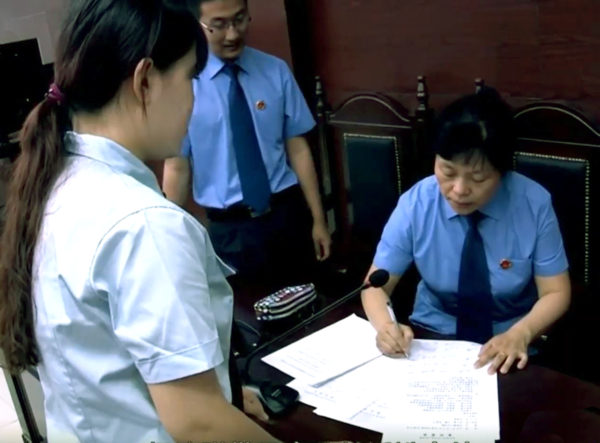◎ How the Xi administration handles the Falun Gong issue will be an important benchmark of his dedication to legal reform.
According to Minghui.org, a website run by adherents of the spiritual practice Falun Gong, the Qikai District Procuratorate acquitted and released female Falun Gong adherent Gu Lina on Nov. 11. Qikai District is in Changchun, the city where the spiritual practice was founded in 1992.
Why it matters: Based on our research, no Falun Gong adherents were acquitted during the Jiang Zemin era. How the Xi Jinping administration handles the Falun Gong issue will be an important benchmark of his dedication to legal reform.
In the 19th Party Congress report, Xi again emphasized the supremacy of the constitution, the need to implement the “rule of law,” and announced the setting up of a Leading Group for Advancing Law-based Governance.
The big picture: Falun Gong was one of China’s largest spiritual communities (estimated 70 million to 100 million adherents) until Jiang targeted the practice for persecution in July 1999. According to media associated with Falun Gong, Jiang instructed the Political and Legal Affairs Commission (PLAC) at various levels and the “610” Office (a Gestapo-like unit that specifically targets Falun Gong) to “ruin the reputations, financially bankrupt, and physically destroy” Falun Gong adherents. Independent researchers say that the bulk of the prisoners of conscience whom the Chinese Communist Party (CCP) carried out organ harvesting on were practitioners of Falun Gong.
While mass arrests of Falun Gong adherents are documented every month and the CCP has not announced any change in the persecution policy, there have been subtle shifts since Xi took office in 2012:
- In December 2012, Xi talked about a “constitutional dream” in a speech.
- In January 2013, Xi ordered the closure of the labor camp system. Falun Gong adherents made up half of the labor camp population at some points during the Jiang era.
- According to Freedom House, the last concerted “transformation” campaign against Falun Gong took place between 2013 to 2015, with none following after.
- In July 2016, Central PLAC chief Meng Jianzhu said that past misjudged cases, particularly ones where confessions were extracted through torture, must be corrected during a national PLAC meeting held in Changchun.
- In mid-2016, the Central Commission for Discipline Inspection (CCDI) probed the “610 Office.” Later in the CCDI’s official evaluation, the “610 Office” was censured for not “implementing the spirit of the law.”
- After Xi more fully consolidated his control over the military and became the CCP “core” leader during the 6th Plenum, Minghui.org reported cases where local courts and procuratorates rejected Falun Gong cases filed by local Public Security Bureaus. At least 54 Falun Gong adherents from 21 provinces were freed in this manner in the first half of 2017, according to Minghui.org.
Meanwhile, the European Parliament and the United States House of Representatives issued legislation in 2013 and 2016 respectively condemning the CCP’s organ harvesting practices.
Our take:
- Before Jiang’s persecution campaign, many Chinese officials and their relatives, including those in the CCP’s upper echelons, practiced Falun Gong. State media once reported that then Jiangsu Party secretary Chen Huanyou frequented a public square in the morning to perform Falun Gong exercises.
- Falun Gong is the first social group that the CCP hasn’t been able to eliminate after officially declaring to do so. On the contrary, the CCP appears to have created its biggest “enemy”—according to CIA insiders, the CCP is most fearful of the Falun Gong spiritual community and the book “Nine Commentaries on the Communist Party” published by Falun Gong-linked media. Adherents in China and overseas usually encourage mainland Chinese to “tuidang,” or renounce the CCP via an online portal.
- Jiang Zemin backed former Chongqing chief Bo Xilai’s attempt to oust Xi Jinping through a coup because Xi’s stance on the Falun Gong persecution campaign was unclear while Bo had proactively participated in persecution. Having Bo in power would give Jiang assurance that he wouldn’t be taken to justice on the Falun Gong issue.
- Part of the reason for Xi’s anti-corruption campaign is the need to safeguard himself and his allies against further coup or assassination attempts from the Jiang faction. Xi has purged over 1.5 million officials to date, and has offended the entire officialdom as a result.
- One possible outlet for Xi to preserve his authority and ensure his safety is maximizing public support. If Xi amicably resolves the Falun Gong issue and other religious and ethnic problems, he could win the hearts of hundreds of millions of Chinese citizens overnight.












